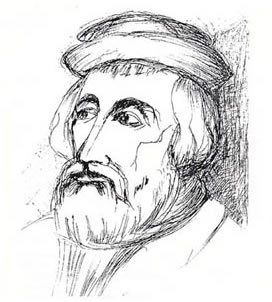Prominent Poles
Paweł Włodkowic ( known in Latin as Paulus Vladimirus) scholar, medieval civil rights activist, doctor of canon law, rector of the Cracow Academy

Born: 1370, Brudzen, Poland
Died: between October 9, 1435 and 14. April 14, 1436, Klodawa, Poland
Quotation from New York Times.
A century before Vitoria, he [Wlodkowic]defended not only the rights of Christian nationalities but also of "infidels" to possess their own lands, goods and government. God, Wlodkowic believed, wills a multiplicity of nations. He recognized the need for some form of international authority. But he did not want one that would crush diversity. It was a position that seems to prefigure John Paul II's own
.
Early days. Born to a noble family,coat of arms Dolega. Though it is commonly assumed that "Włodkowic" was a surname, it was in fact a patronymic denoting that he was the son of a certain Włodko or Włodzimierz. Wlodkowic studied at Prague University, where he took degrees in 1393 and in 1396. He continued studying law at Padova, Italy, in 1404-1408. In 1411 or 1412 he was made a doctor of canon law at the Academy in Cracow, where he also began to lecture.
Work. He was influenced by the philosophies of William of Ockham, Matthew of Cracow and Stanisław of Skarbimierz. In 1413 he served as King Wladyslaw Jagiello 's emissary at Buda, Hungary, during disputes with the Teutonic Order. In 1414-1415 he became rector and in 1418 prorector of Cracow Academy. Paweł Włodkowic represented Poland at the 1414 Council of Constance, where he delivered a thesis about the power of the Pope and the Emperor, the Tractatus de potestate papae et imperatoris respectu infidelium (Treatise on the Power of the Pope and the Emperor Respecting Infidels). In it he drew the thesis that pagan and Christian nations could coexist in peace and criticized the Teutonic Order for its wars of conquest of native non-Christian peoples in Prussia and Lithuania. Due to his influence, in 1421 the Pope sent Antionio Zeno to investigate the Teutonic Order and its activities. At that time, along with Stanisław of Skarbimierz, Paweł Włodkowic strongly supported the idea of conciliarism and pioneered the notion of peaceful coexistence among nations a forerunner of modern theories of human rights. In 1420 Paweł Włodkowic represented Poland at a conference between Poland and the Teutonic Order held in Wrocław (then probably Vratislav in the Kingdom of Bohemia) under the aegis of Sigismund of Luxemburg. Throughout his political, diplomatic and university career, Paweł Włodkowic expressed the view that a world guided by the principles of peace and mutual respect among nations. After 1424 Paweł Włodkowic retired from public life to Kłodawa, where he died in 1435.
This article uses mainly material from the Wikipedia article "Pawel Wlodkowic" licensed under the GNU Free Documentation License. :
Wikipedia
Other sources:
Encyclopedia Britannica
Kirchenlexikon (in German)
Beliefs (New York Times)
Jaroslaw Jakubowski (Jagiellonian Univ.- in Polish)
English translations of some of his works see:
Constance J. Ostrowski
Return to home page:
Prominent Poles
